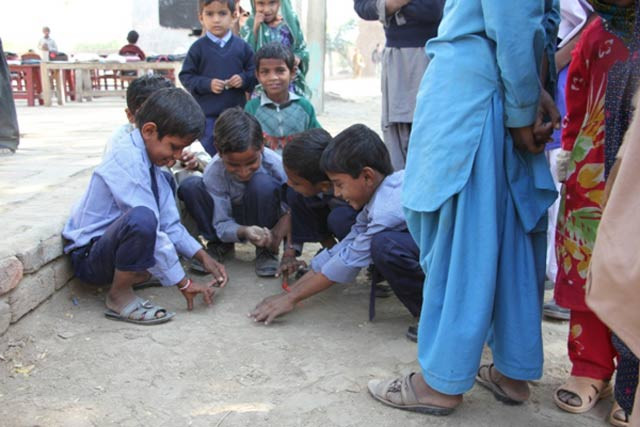An oasis of education: Sindh Education Foundation’s struggle to improve literacy in Umerkot
When children see visitors entering site, they get up and chant ‘welcome, sir’ and ‘welcome, madam’ with...

Children playing marbles at break time at Alyousif school.

The school in Malik Khan is funded and supported by the Sindh Education Foundation (SEF). The operator, Manzoor Bhatti, who is running three schools supported by the SEF, is eager to get the building for the school in Malik Khan constructed as soon as possible. Bhatti’s dream is to see all children of school-going age get an education. And he has already managed to find committed female teachers who show no sign of fatigue or indignation that their counterparts in government schools are infamous for.


Bhatti provides free transportation to the children and teachers, some of whom travel as many as 20 kilometres to get to the school. He is also reaching out to Church World Service and Right to Play, two reputed NGOs working on capacity building of teachers to make education fun and children-centred, for additional resources.

Public versus private: Mirror mirror on the wall, who is the best educator of all?


Another school run by Bhatti for many years, the Al-Yousif School is in one of the most underdeveloped areas of the district. The roads there are dilapidated and the peasant population scattered. According to a short survey conducted by Al-Yousif School volunteers, 10 functional government schools and two private schools are present in a 20-kilometre radius. However, these are marred by teacher absenteeism, poor teaching methods and brutal corporate punishment. The private schools, on the other hand, are inaccessible because of their expensive fees.

The SEF is providing quality education to 350,000 children through 2,000 schools and educational centres across the province. It has, however, seen its share of misconduct. For the past few years, some low-ranking officials of the foundation allegedly started accepting gifts from opportunists in return for inflating the number of enrolled children at their schools. Thus, operators like Bhatti were not issued funds as readily as those who lined pockets.
Fortunately, the SEF has learnt its lesson. It has improved its system and instead of relying on the head count, the foundation collects profiles of school-going children at the end of the academic year. The children are assessed by the Aga Khan Institute. This way, ghost students are automatically discarded.


One of the 10 schools I visited in the district was in Umerkot city run by educationist Keval Lahva. The school sports fancy furniture, flawlessly painted walls and drawings on classroom walls. He is in the process of expanding the school building by adding more classrooms, washrooms and even a zoo. Enrollment at his school has swelled to 700 children at present.

Education goals: 'Nearly 0.25m more children to be enrolled by 2016'
Another school is run by local educational icon, Asso Bai, a differently-abled girl who has made headlines due to her commitment to impart education in rural Umerkot. Asso Bai was undergoing a surgery when I visited the school. Although there were quite a few children studying there, the two thatched mud rooms were not very clean.

Two other schools that I visited were also a little bit of a disappointment. They were in stark contrast to the others I went to and suffered from low enrollment, dilapidated buildings and unhygienic conditions.


Still, there is a lot of hope. The SEF managing director Naheed Shah Durrani is a dedicated visionary committed to imparting quality education to marginalised segments of the society. And even with the duplication of children already enrolled in government schools resulting in wastage of government resources, the foundation is striving hard to make a difference.

Gulsher Panhwer is a consultant and freelance columnist focusing on cultural and environmental issues.



















COMMENTS
Comments are moderated and generally will be posted if they are on-topic and not abusive.
For more information, please see our Comments FAQ